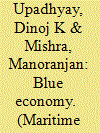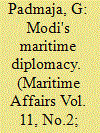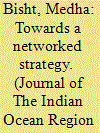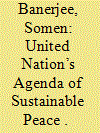|
|
|
Sort Order |
|
|
|
Items / Page
|
|
|
|
|
|
|
| Srl | Item |
| 1 |
ID:
181697


|
|
|
|
|
| Summary/Abstract |
Blue economy, which promotes sustainable usages of ocean resources for economic growth and development, as well as preservation of the health of ocean ecosystem, has become a crucial element of the broader ecosystem of sustainable and inclusive development. The desire to sustainably harness the potential of ocean and marine resources has been amply visible at the national and global level. Technological innovations, investment and multilateral cooperation have further been facilitating progress in the sectors of blue economy. Placed in a central position in the Indian Ocean and with a vast exclusive economic zone (EEZ), India has substantial potential for tapping marine resources and blue economy could emerge as the paradigm of development in the future. New Delhi has taken many initiatives to promote blue economy activities and development of modern infrastructure for greater connectivity, international collaboration and trade facilitation. Further, it is seeking wider multilateral cooperation in areas of financing, technology transfer, capacity building and knowledge sharing. This paper underlines the importance of blue economy in a broader framework of sustainable development and analyses India’s foreign policy orientation towards blue economy. Finally, it also discusses cooperation between India and European countries in the sectors of blue economy.
|
|
|
|
|
|
|
|
|
|
|
|
|
|
|
|
| 2 |
ID:
181623


|
|
|
|
|
| Summary/Abstract |
Since the dawn of the twenty-first century, the Horn of Africa has undergone significant change. Presence of extra-regional powers has transformed the region into a strategic pivot of the Indian Ocean. But fractured societies of the region are in acute need of sustainable peace. Curiously, India’s engagements with the Horn have been confined to peacekeeping operations and anti-piracy patrols. As a member of the United Nations Security Council in 2021 and 2022, India could do more. Against this backdrop, this article examines the salience of the Horn of Africa as a strategic pivot. It assesses the challenges and opportunities for engaging a region that is steeped in geopolitics but yearns for sustainable peace. It seeks to develop a framework for India’s engagement in the Horn of Africa by evaluating the complementarities between the United Nations agenda of sustaining-peace and India’s vision of Security and Growth for All in the Region.
|
|
|
|
|
|
|
|
|
|
|
|
|
|
|
|
| 3 |
ID:
144478


|
|
|
|
|
| Summary/Abstract |
This paper examines the maritime diplomacy of India's Prime Minister Modi, and argues that it is encapsulated in the acronym SAGAR, i.e. security and growth for all in the region. This vision also spells out that maritime security is the primary responsibility of the littoral states, while stressing cooperation and collaboration. It also highlights aspects of the Blue Economy and suggests that SAGAR is nonassertive, seeks peaceful resolution of disputes and calls for a commitment by all countries to adhere to international maritime laws. The paper argues that India conducts its maritime diplomacy at three levels which give it a “strategic strength”. They are: high-level bilateral visits where strategic issues are an important component; regional collaborative means; and, lastly, revitalizing the cultural and civilisational links with projects such as “Project Mausam”. The paper concludes that the International Fleet Review to be held at Vishakhapatnam in 2016 gives India a “strategic opportunity” to contribute to a maritime narrative which may be able to address the mistrust in the current global maritime order.
|
|
|
|
|
|
|
|
|
|
|
|
|
|
|
|
| 4 |
ID:
177593


|
|
|
|
|
| Summary/Abstract |
This article revisits the widely cited SAGAR speech by the Indian Prime Minister Narendra Modi, delivered on 12 March 2015, at Port Louis, Mauritius. It takes the speech as a foundation to revisit the meaning of maritime South Asia, bringing to fore a ‘networked identity’ of the Ocean. This approach, while incorporating a dimension of resilience, also offers a conceptual/policy window to deal with complex traditional and non-traditional threats emanating from maritime space. Concepts from network literature, such as connections, relationality and communication are employed to invoke networked imageries of the Ocean at a metaphorical, conceptual and praxeological level. In arguing for international/interregional maritime cooperation, SDG-14 is presented as an essential background condition for effective translation of SAGAR speech into this novel framework, which helps in raising critical questions related to maritime security and development.
|
|
|
|
|
|
|
|
|
|
|
|
|
|
|
|
| 5 |
ID:
176606


|
|
|
|
|
| Summary/Abstract |
Two decades into the twentieth century, traditional interstate conflicts
continue to persist. However, peace and security are no longer
measured only in terms of conventional wars. Under-development in
many parts of the globe manifests itself in crime, terrorism, and civil
wars which, invariably, have a transnational character, and affect
regional stability. In 2016, the United Nations Security Council and
the General Assembly adopted concurrent resolutions on Sustainable
Peace, recognising that development, peace, and security are firmly
interlinked. In 2015, Prime Minister Modi enunciated India’s foreign
policy vision of Security and Growth for all in the Region (SAGAR)
that conflates security with development. This paper seeks to access
the extent to which the United Nations has been able to deliver on its
sustainable peace agenda. It examines the conceptual compatibility
between sustainable peace and SAGAR. Finally, the essay argues
that SAGAR not only provides a framework for maritime governance
in the Indian Ocean but is also a strategy for sustainable peace with
a global footprint.
|
|
|
|
|
|
|
|
|
|
|
|
|
|
|
|
|
|
|
|
|